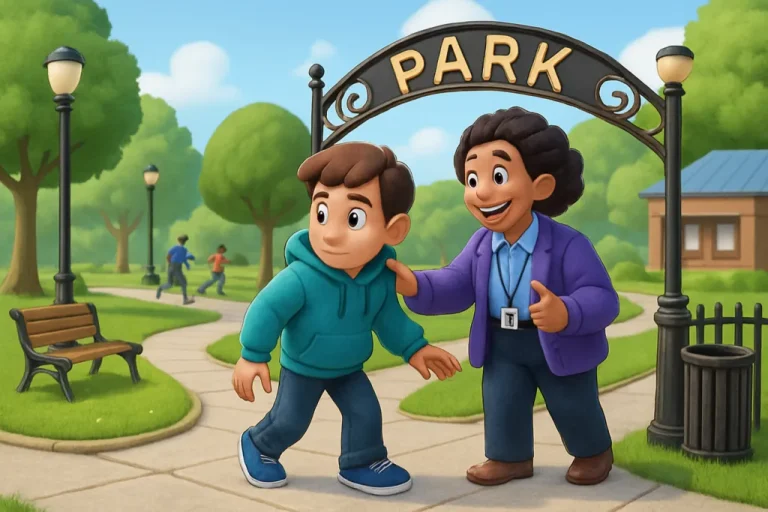What is Autism?
Autism, or Autism Spectrum Disorder, is a neurological difference that encompasses a wide range of challenges, strengths and behaviours. Autism is often diagnosed in early childhood, but it is lifelong and shapes the daily experiences of autistic individuals into adulthood. Autism is a “spectrum” which outlines the variability in the symptoms among people with ASD and showcases the importance of embracing and understanding neurodiversity.
The team at Unique Community Services understands the essential roles of support workers in delivering person-centred care. We value everyone’s unique experiences and provide compassionate and tailored support crucial for well-being and independence. This perspective of ASD encourages a different approach to providing support. Promoting well-being is an essential aspect of supporting individuals with ASD, as autistic adults may face unique challenges, such as social communication and navigating the outside world, or may need help strengthening their skills.

By outlining the importance of early intervention, we can do so much more as a society and contribute to delivering a positive impact on people’s developmental and learning trajectories. The ongoing support and awareness help create a safe space where people’s mental health and quality of life can be improved. By embracing a progressive and inclusive approach, focusing on diversity and equality, we can contribute to creating a society that values neurodiversity and delivers individualised support for people across the entire spectrum.
What is Bipolar Disorder?
Bipolar disorder is a mental health condition characterised by intense mood swings which impact people’s daily lives. This manifests through depressive or manic episodes, and the symptoms may range from euphoric states to periods of depressive mood. Bipolar disorder affects emotional well-being and quality of life. It is essential to recognise the severity of these episodes, making bipolar disorder complex and challenging for both individuals and their support circle.
Understanding bipolar disorder involves learning about the multifaceted nature of the condition and encompasses various factors that contribute to its development. Although the causes remain unknown, neurobiological factors, genetic predispositions and environmental influences play key roles in the onset of bipolar disorder. Recognising the early signs and symptoms is essential for timely intervention.
Following a progressive and informed care plan can help create a compassionate environment that provides support for people with mental health challenges.
Overlapping Symptoms and Behaviours
Autism and bipolar disorder are very different, but they share some of the same symptoms and behaviours, making the diagnosing process challenging. By finding common ground between ASD and BD, healthcare professionals can contribute towards creating a more inclusive and encompassing approach to support and provide an accurate diagnosis.
Shared Symptoms and Behaviours
Some of the shared symptoms of bipolar disorder and ASD include:
- Difficulties maintaining reciprocal relationships
- Elevated mood
- Depressed mood
- Challenges with social interactions
- Difficulties adapting to a change
- Emotional dysregulation
- Sleep disturbances
- Repetitive behaviours
Differentiating Factors
When determining an accurate diagnosis, healthcare professionals rely on comprehensive assessments. The duration, nature, age of onset and expression, and severity of the symptoms are pivotal in determining the accurate diagnosis. Understanding the key differences is essential for accurate identification. The most common differentiating factors that help determine an accurate diagnosis include the duration, the way symptoms are expressed and the age of onset.
Age of Onset
- Autism is a neurological difference that people are born with
- Bipolar disorder may develop later in life and mainly manifests in adolescence or young adulthood
Impulsive Behaviors
- People with ASD and BD can both exhibit impulsive behaviour, but in BD, this happens in a cyclical manner, while with ASD, it doesn’t follow a specific cyclical pattern
Social Communication
- It is common for people on the autism spectrum to experience challenges with social communication and sensory issues
- While people with BD aren’t typically associated with social communication challenges, they may face challenges with their social relationships
Depression and Thoughts of Self-Harm
- Bipolar disorder causes severe episodes of depression that often lead to having harmful thoughts
- People with autism may experience depression as well, but these episodes are not considered a symptom of ASD
Diagnosis and Assessment
The diagnosis and assessments of autism and bipolar disorder include a comprehensive evaluation by a medical professional who will closely monitor the behavioural, emotional and social functioning of the individual. For people with autism, the diagnostic process usually starts with observing and analysing the critical traits and understanding the challenges with communication and behaviours.

Health professionals will utilise standardised interview and assessment methodologies involving caregivers, teachers and parents to receive meaningful input that will better understand the developmental history and functioning. The recognition of the signs of autism is essential for early intervention and receiving proper support, which aims to enhance people’s social as well as communication skills. The symptoms of autism can vary, so taking a personalised approach towards a proper diagnosis allows for targeted and person-centred interventions that will take into consideration the unique strengths and challenges of every person.
Additionally, diagnosing bipolar disorder will also involve a careful examination of the person’s mood patterns and the manifestation of the other symptoms of BD, which may include manic or depressive episodes. The mental health professionals will use standardised tools to evaluate the frequency and intensity of mood swings and their impact on daily functioning. Once diagnosed, the treatment plan will involve various therapies, mood-stabilising medications and coping strategies.
Challenges with Misdiagnosis
The challenges associated with misdiagnosing Autism Spectrum Disorder or bipolar disorder require a detailed understanding of the nature of the differences and the diagnostic processes. Autism, which is mainly characterised by difficulties in social interactions and communication, will often present a variety of other symptoms that can overlap with other differences as well, such as attention deficit hyperactivity disorder (ADHD). The spectrum poses further challenges in the diagnostic process since some people may exhibit varying levels of severity of the symptoms. Misdiagnosing autism may lead to delayed intervention and receiving proper support that can improve the long-term outcome for people on the spectrum.
Also, bipolar disorder is often misdiagnosed. The nature of BD and its dynamic symptoms can make diagnosing challenging. Misdiagnosis usually happens due to the overlapping of symptoms with mood disorders or psychiatric disorders like borderline personality disorder. Understanding all of the neurobiological underpinnings of BD is essential as it adds another level of complexity to the diagnostic process. Mental health professionals face challenges in navigating the nuances of BD because of the evolving research field and range of symptoms.
Can You Be Autistic and Be Bipolar?
The latest research developments indicate that people with autism may comorbidity experience bipolar disorder. The studies suggest there is a notable prevalence of BD symptoms among both children and adults, with some research showing that up to 27% of autistic people show some signs of bipolar disorder. This intersection outlines the need for compassionate support and person-centred, tailored interventions to address the challenges. It is crucial to maintain a humanised approach and foster a diversified approach towards well-being.
Support and Treatment Options
The support options to treat bipolar disorder have evolved over the years and have slowly started to reflect a more humanised approach to mental health care and well-being. The treatment for bipolar disorder has also seen huge advancements through a combination of pharmacological and psychotherapeutic interventions. Cognitive-behavioural therapy or dialectical behaviour therapy, for example, provides the much-needed coping strategies and regulation skills to help people navigate BD’s challenges.
Additionally, through the increased awareness of depression for people diagnosed with BD, following a tailored and humanised approach can address all aspects of this mental health condition and foster a more comprehensive therapeutic plan.
As society gains more understanding of neurodiversity, there has been an increase in humanised support options for autistic individuals.
Support systems for autism spectrum disorders may entail:
- Behavioural therapy
- Cognitive behavioural therapy
- Person-centred care plans
- Educational interventions and support
- Social skills training and support
This progressive approach will focus on people’s unique strengths and help provide a holistic environment to enhance personal growth and development. The advancements in technology and various communication tools opened many new opportunities for improving the quality of life and health outcomes for autistic adults and children, promoting social integration and independence.
Autism and Bipolar Support with Unique Community Services
Unique Community Services focuses on delivering a person-centred approach to supporting people with autism and bipolar disorder. We put each person’s needs first and focus on delivering compassionate care and support for all. Our highly trained clinicians are always focused on fostering a supportive environment where people can thrive. We focus on people’s unique abilities and strengths and provide a holistic understanding of every individual we support so that together we can achieve their goals.
The foundation of our impact is showcased in our case studies that present the transformative journeys of the people we support and are a testament to our dedication. Providing the proper care and support can help people regain their independence, dignity and privacy.
Contact us today or contact our offices in Manchester and Leeds for a personalised care plan that meets people’s needs.




